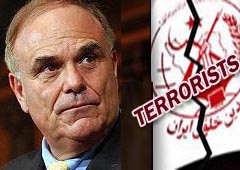It’s no surprise that providing “material support” to a terrorist group is against the law. But a 2010 Supreme Court decision, Holder v. Humanitarian Law Project, concluded it’s not just illegal to
 |
| Indict Rendell: Political elites fall on wrong side of bad law |
ship grenades or suitcases of cash. “Advocacy performed in coordination with, or at the direction of, a foreign terrorist organization” is also a felony.
Why, then, nearly two months after it was revealed that the Treasury Department is investigating former Gov. Ed Rendell for receiving money from a terrorist group to undertake just that sort of advocacy, has he not been indicted by the Department of Justice?
In recent years, Rendell had delivered speeches in support of Mujahedin-e Khalq (MEK), an Iranian Marxist-Islamist group that resides in an Iraqi desert base and that the U.S. designated a terrorist organization for killing Americans during the 1970s.
One 10-minute speech earned Rendell $20,000, and he frequently flew to Europe to call for MEK’s removal from the terror list. That would appear to fall within the extraordinarily broad definition of “material support” used by the Obama administration.
Rendell calls that “ludicrous.” He says, “The only thing we’ve done is spoken out on their behalf. And you certainly can’t in any way encumber free speech in America. You know that ― you’re a journalist.”
I do sort of know that―you shouldn’t be able to encumber free speech. But the Supreme Court did just that, and Muslims have been prosecuted for doing less: a satellite TV salesman sentenced to five years for broadcasting Hezbollah’s TV channel; a man indicted for favorable web comments on shooting U.S. soldiers.
Rendell wouldn’t comment on specific cases, but he rightly noted that the First Amendment protected Communist Party activity during the Cold War. So it did, and it does seem incomprehensible that American law could now criminalize speech in support of a war enemy. But as the War on Terror creeps into its eleventh year, presidents Bush and Obama have erected a monstrous national security state and, in the process, rendered American civil liberties unrecognizably feeble.
“Whatever one’s views are on this ruling, it is now binding law. To advocate on behalf of a designated Terrorist group constitutes the felony of ‘providing material support’ if that advocacy is coordinated with the group,” writes Salon blogger and constitutional law attorney Glenn Greenwald. “They’re providing more substantial ‘material support’ to this Terrorist group than many people ― usually vulnerable, powerless Muslims ― who are currently imprisoned for that crime.”
Rendell, however, contends that he’s protected because the funds, as far as he knows, were “raised by individual Iranian expat groups” in the U.S. and Europe.
“Please,” Greenwald tells me. “Iranians who love MEK pay the fees in order to keep a thin layer of separation―any real investigation will find the source of those funds.”
Finally, Rendell says the law should not apply here: The State Department has urged him to dialogue with the MEK. And MEK’s blue-chip American supporters ― could they all have broken the law?
“If you indict me, I hope you know, you have to indict 67 other Americans who did the same thing, including seven generals … [who] served in Iraq. You’d have to indict James Jones, President Obama’s first NSC chief adviser, you’d have to indict former Attorney General [Michael] Mukasey, former FBI Director Louis Freeh … the whole kit and caboodle.” That caboodle is voluminous and high-powered, including Tom Ridge, UN Ambassador John Bolton, Rudolph Giuliani and Howard Dean, among others.
“You tell me that anyone has the right to restrict my freedom of speech and I’ll tell you you’re dead wrong,” Rendell insists.
I wish I were wrong. The Supreme Court’s three dissenters protested that the decision “gravely and without adequate justification injure[s] interests of the kind the First Amendment protects.” So it does. It’s a frightening law and a horrible ruling that pulverizes First Amendment free speech protections. But as long as political nobodies face prosecution for speech crimes, so should elites. Indict Rendell ― and Ridge, Mukasey, Giuliani, etc. ― or repeal this law.
By Daniel Denvir ,City Paper

